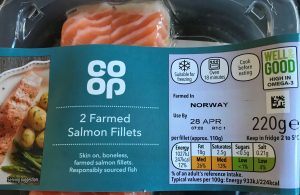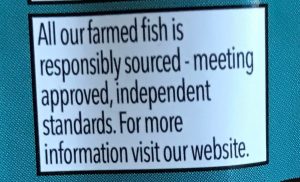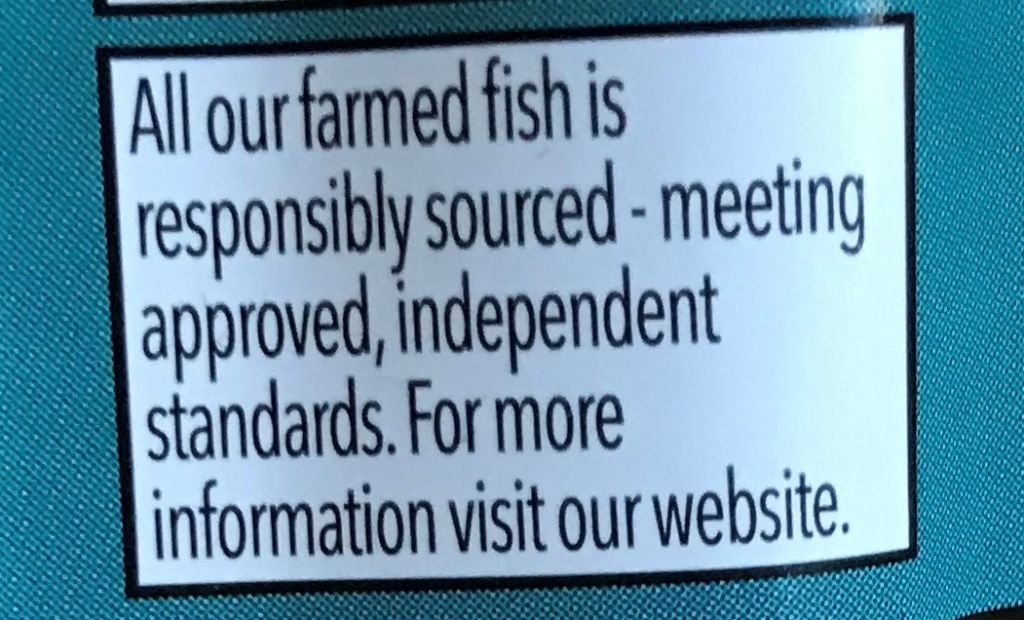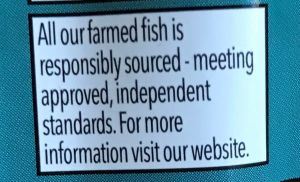Reputation: At the beginning of the year, I was privileged to meet the new chairman of the Scottish Salmon Producers Organisation. I began the conversation by saying that I was glad that I wasn’t a young person beginning their career now in the salmon farming industry because I am not convinced that there will be much of an industry left in twenty years’ time. The thoughts behind my comments were that there is so much negativity spoken about the industry that it is difficult to see how the industry can grow and develop. In addition, the existing industry might find is increasingly difficult to operate without ever more stringent regulation. It appears that the reputation of the salmon farming industry is becoming ever more tarnished.
Intrafish has now reported that a new survey conducted in Norway has found that the reputation of salmon farming has fallen over the last decade. The analytical company Kantar TNS undertook this survey measuring reputation using the TRIM index. Ten years ago, salmon farming industry gained a score of 48 whereas the latest score is just 36. By comparison, the fisheries and agriculture sectors attained scores of 52 and 49, respectively. Interestingly, by changing the words salmon farming to aquaculture increases the score by 10 points.
It is important to point out that it is salmon farming that is the issue not the salmon. When asked about the reputation of salmon as a food, the TRIM score was a more gratifying 69. This is not surprising given that salmon is one of the most popular fish chosen by consumers to buy.
However, those consumers who do regularly eat salmon are those who are becoming increasingly sceptical about the environmental impacts of salmon production. They are also concerned about how open the industry is about what they do. Yet at the same time, many consumers are not concerned enough to find out exactly what the salmon farming industry does for themselves.
The salmon farming industry, not just in Norway, has been working hard over recent years to address many of the concerns about any impacts on the environment so this increased scepticism might be surprising to some in the industry. However, I would suggest that the writing has been on the wall for some time, hence my comments to the SSPO chairman back in January.
The problem for salmon farmers is not that they are encountering a wider range of issues but rather that there is an increasing likelihood that consumers are being exposed to coverage about the issues. Unfortunately, many of the negative messages being spread are based on either misinformation or are factually incorrect. This is not of any surprise as many of these messages are based on other people’s agendas.
Many of the concerns about salmon farming’s impacts on the environment began when the big US charitable foundations funded a $33 million campaign to demarket farmed salmon. These foundations were concerned that imports of farmed salmon would undermine the wild salmon fisheries in Alaska by competing for consumers in the marketplace. They funded about thirty environmental groups to spread messages such as ‘Farmed and Dangerous’. They hoped that this campaign would deter US consumers from buying imported salmon and select locally caught fish instead. What those funding the campaign did not anticipate was that consumers actually preferred the taste of imported Atlantic salmon to that of locally caught wild species so consumption actually grew rather than declining. Although the campaign eventually floundered, not least because it was exposed by independent researcher Vivian Krause, the negative messages about salmon farming persisted mainly because environmental groups identified that focusing on the environmental impacts, whether true or false was a sure fire way of fund raising. This is still very much the case today.
One of those who has benefited from using salmon farming as a cause to fight for the environment is award winning campaigner Don Staniford. In 2002, Mr Staniford was one of the winners of the now defunct British Environment and Media Awards as awarded by WWF. Mr Staniford has campaigned against salmon farming in Norway and Canada, from where he was eventually deported after losing a defamation case against salmon farming company Mainstream Canada. At the time the company told Fish Farming Expert that ‘The soul of a company is its employees, and we need to stand up for them and defend them against malicious and defamatory attacks, and against cyberbullying’. Mr Staniford is now operating in the UK relying on Freedom of Information requests as a way of attacking the industry.
Criticism of the salmon farming industry comes from many quarters ranging from international NGOs to social media’s keyboard warriors. However, they all have one thing in common. That is the knowledge that the salmon farming industry has been extremely reluctant to stand up and defend itself. Why this is, remains a complete mystery to me. It seems that the industry believes that standing up to the critics might draw even more attention towards the industry and lead to greater unjustified criticism. At the same time, there appears to be a belief that the way forward is to rely on good news stories only. I am not convinced.
I would argue that if the industry’s reputation is being questioned, especially with misinformation and factual inaccuracies, then the only response is to make sure that those who are sceptical are provided with factually correct information.
The rise of social media has become one of the battlegrounds about salmon farming. Keyboard warriors have found that they can say what they like irrespective of the truth. My experience is that when I have provided a factual account to correct their critique, my response has never been challenged. Instead, they tend to resort to attacking me in person. At the same time, they refuse to emerge out from behind their keyboards to discuss the issues because they realise that they do not have the arsenal to counter the factual messages, other than to try to discredit the messenger. The minority who make up their followers are unlikely to be swayed by any argument but as the Kantar survey has found, the increased scepticism about the industry comes from mainstream consumers not the keyboard warrior minority, whose views will never be changed.
The Coronavirus crisis has dominated the news, and rightly so, but this has meant that other news stories have taken second place. There has been a noticeable reduction of media coverage about salmon farming, especially in the mainstream press. However, even before the crisis, the press had already suffered a reduction in readers as more of the public sought their news online and consequently, the press has needed fewer journalists. As a result, those that are still working are happy to receive stories that require little input from themselves to fill up space. Salmon farming was one of the subjects that fell foul of this approach to journalism. Now that coronavirus has taken over the news, such space filling stories are not needed.
However, there will be a time when coronavirus no longer dominates the front pages and the old order returns. When this happens, the industry needs to take a much more proactive approach. I have always believed that the industry cannot avoid negative stories being written about it but when they appear, the industry should not accept them as fait-accompli.
Sometimes, journalists do approach the industry for comment but often this appears as a platitude rather than a rebuttal or a correction. This is often because the industry is at the mercy of the journalist. It is usually unlikely that a correction in the letters page will be published. Instead, I would argue that the industry should put out a statement that is sent to every journalist and editor correcting the story. If this happens every time a negative story appears, then eventually, journalist might start to check whether the story has any validity before it is published. It is the constant drip-drip of such negative stories that contributes to the increased scepticism of the industry by the public. Currently, the industry appears to allow stories to be published unchallenged.
A recent example concerned the use of thermolicers to control sea lice. The National newspaper reported that Dr Lynne Sneddon, who has proved that fish feel pain, claims that according to a range of studies, the temperatures used are several degrees hotter than the fish can withstand. However, these studies refer to fish exposed to high temperatures for several minutes whereas fish passing through the thermolicer are exposed for seconds not minutes. The industry should have responded by challenging the science presented and shown it to be misleading in this instance. Instead, the industry response reported by the National was that the ‘Scottish salmon farming sector continues to invest and innovate in the management of such challenges. Fish health and welfare will always be our members top priority’. Unfortunately, this sounds like a standardised response rather than one that addresses the specific issue. It is not surprising that the public are increasingly sceptical. This is why immediate rebuttal is urgently needed.
I am not alone in this view. I heard on the grapevine that at least one salmon farming company in the UK thinks that more should be done but their attempt to do so floundered when it was put to the industry representatives. I am sure that those who represent the industry are extremely skilled in what they do but in recent years, they are less likely to have had any direct experience of the industry themselves. This has helped contribute to the increased scepticism about salmon farming. Whilst the Kantar survey took place in Norway, I would argue a similar outcome would emerge in the UK if the survey was conducted here.
However, it is not just the media that has contributed to the increased scepticism about salmon farming. There are ever more NGO’s adopting a negative view of salmon farming. Their views can permeate throughout day to day life and influence wider opinion on salmon farming. For example, the Co-op has recently uploaded their details to the Ocean Disclosure Programme. This is intended to provide information about where the various retailer’s seafood comes from. Although the entry for farmed salmon says that the fish is certified, the Coop also highlight the rating of the fish as provided by the Good Fish Guide, part of the Marine Conservation Society’s activities. Salmon is listed as ‘Think 3’. The Good Fish Guide says that their rating system has been developed by the MCS to help consumers choose the most environmentally sustainable fish. A rating of 3 means ‘Think’ there may be better rated alternatives available. Although farmed salmon is probably the Coop’s best-selling fish, the question to be asked is, if these ratings are so important, why are they not stocking these better rated alternatives instead? In fact. The Coop’s packs of salmon clearly state that ‘All our farmed fish is responsibly sourced -meeting approved, independent standards.@ Why then do their customers need to ‘think’ about whether they eat salmon or not?


The trouble is that whilst the Marine Conservation Society has carved a niche for themselves in deciding whether fish are sustainable or not, they are not questioned as to what they say. In their guide, the Marine Conservation Society state that ‘Salmon are farmed in open net pens in the sea. Producing fish in open systems can cause environmental impacts such as: impacts of chemical and sea lice treatment usage; nutrient and organic waste deposition; outbreaks of disease; impacts on wild salmonids by transmission of sea lice, and escapes from farms. Salmon are carnivorous fish and rely on wild capture fisheries to produce their feed, MCS would like to see all these fish certified as sustainably managed. Due to the ongoing nature of yet unresolved environmental impacts of salmon farming MCS is advocating a halt in industry expansion until these can be resolved’.
I am not aware that the salmon farming industry has so far challenged the MCS about their ratings and their views. In the past, I have questioned some of the claims the MCS have made and like other critics, they failed to respond. The MCS make much about the use of fish in salmon feed but have consistently failed to express similar concerns about the use of fish in pet food. They know that this is a sure fire to alienate themselves from a public who are passionate about providing their pets with everything they need and that includes pet food containing fish. Like with other NGO’s, salmon farming is a much easier target.
Fortunately, consumers who do ‘think’ about the salmon they eat recognise that not only is salmon good to eat but that it is produced responsibly otherwise retailers like the Coop would not stock it. However, if the negative messages continue unchallenged the consumer response may in future be hugely different. The Norwegian Kantar TRIM survey should be the writing on the wall. Hopefully, someone will heed the message. If not, the younger people in our industry may find that their long-term career aspiration might disappear before their eyes.


